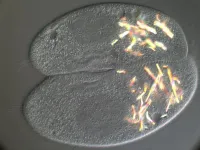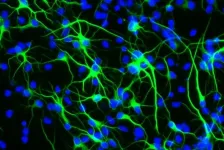INFORMATION:
Bibliography:
DOI 10.1038/s41586-020-03094-7
https://www.nature.com/articles/s41586-020-03094-7
The melting of large icebergs is a key stage in the evolution of ice ages
2021-02-19
(Press-News.org) A new study, in which the Andalusian Earth Sciences Institute (IACT) (CSIC-UGR) participated, has described for the first time a key stage in the beginning of the great glaciations and indicates that it can happen to our planet in the future. The findings were recently published in the scientific journal Nature
The study claims to have found a new connection that could explain the beginning of the ice ages on Earth
Antarctic iceberg melt could hold the key to the activation of a series of mechanisms that cause the Earth to suffer prolonged periods of global cooling, according to Francisco J. Jiménez-Espejo, a researcher at the Andalusian Earth Sciences Institute (CSIC-UGR), whose discoveries were recently published in the prestigious journal Nature.
It has long been known that changes in the Earth's orbit, as it moves around the Sun, trigger the beginning or end of glacial periods by affecting the amount of solar radiation that reaches the planet's surface. However, until now, the question of how small variations in the solar energy that reaches us can lead to such dramatic shifts in the planet's climate has remained a mystery.
In this new study, a multinational group of researchers proposes that, when the Earth's orbit around the sun is just right, the Antarctic icebergs begin to melt further and further away from the continent, moving huge volumes of freshwater from the Antarctic Ocean into the Atlantic.
This process causes the Antarctic Ocean to become increasingly salty, while the Atlantic Ocean becomes fresher, affecting overall ocean circulation patterns, drawing CO2 from the atmosphere and reducing the so-called greenhouse effect. These are the initial stages that mark the beginning of an ice age on the planet.
Within this study, the scientists used several techniques to reconstruct oceanic conditions in the past, including by identifying tiny fragments of rock that had broken away from Antarctic icebergs as they melted into the ocean. These deposits were obtained from marine sediment cores recovered by the International Ocean Discovery Program (IODP) during Expedition 361 off the sea-margins of South Africa. These sediment cores enabled the scientists to reconstruct the history of the icebergs that reached these latitudes in the last million and a half years, this being one of the most continuous records known.
Climate simulations
The study describes how these rocky deposits appear to be consistently associated with variations in deep ocean circulation, which was reconstructed from chemical variations in minute deep-sea fossils known as foraminifera. The team also used new climate simulations to test the proposed hypotheses, finding that huge volumes of fresh water are carried northward by icebergs.
The first author of the article, PhD student Aidan Starr from the University of Cardiff, notes that the researchers are "surprised to have discovered that this teleconnection is present in each of the different ice ages of the last 1.6 million years. This indicates that the Antarctic Ocean plays a major role in the global climate, something that scientists have long sensed, but that we have now clearly demonstrated."
Francisco J. Jiménez Espejo, a researcher with the IACT, participated in his capacity as a specialist in inorganic geochemistry and physical properties during the IODP 361 expedition aboard the JOIDES Resolution research vessel. For two months, between January and March 2016, the research team sailed between Mauritius and Cape Town, collecting deep-sea sediment cores.
Jiménez Espejo's main contribution to the study focused on identifying the geochemical variations associated with glacial and interglacial periods, which has made it possible to estimate with greater accuracy the age of the sediment and its sensitivity to the different environmental changes associated with those periods.
Over the course of the last 3 million years, the Earth began to experience periodic glacial cooling. During the most recent episode, about 20,000 years ago, icebergs continuously reached the Atlantic coasts of the Iberian Peninsula from the Arctic. Currently, the Earth is in a warm interglacial period known as the Holocene.
However, the progressive increase in global temperature associated with CO2 emissions from industrial activities could affect the natural rhythm of glacial cycles. Ultimately, the Antarctic Ocean could become too warm for Antarctic icebergs to be able to carry freshwater north, and therefore a fundamental stage in the beginning of the ice ages--the variations in thermohaline circulation--would not take place.
Ian Hall, also of Cardiff University, who co-directed the scientific expedition, indicates that the results may contribute to understanding how the Earth's climate may respond to anthropic changes. Similarly, Jiménez Espejo, notes that "last year, during an expedition aboard Hespérides, the Spanish Navy research vessel, we were able to observe the immense A-68 iceberg that had just broken into several pieces next to the islands of South Georgia. Ocean warming may cause the trajectories and the melt patterns of these large icebergs to alter in the future, affecting the currents and, therefore, our climate and the validity of the models that scientists use to predict it."
ELSE PRESS RELEASES FROM THIS DATE:
Sex that is not for reproduction
2021-02-19
The mating process is one of the most important mechanisms for maintaining genetic variation in natural populations. The emergence of sexual reproduction turned out to be the most important evolutionary innovation that facilitated the evolution of eukaryotes. Paramecium is a well-known genus of ciliated protists with a complex system of 'sexes', or mating types. Paramecium reproduces asexually, by binary fission, which is not related to the mating process. During conjugation, Paramecium of compatible mating types exchange haploid nuclei, equivalent to gametes. The nuclei of each organism ...
Data show lower daily temperatures lead to higher transmission of COVID-19
2021-02-19
LOUISVILLE, Ky. - The SARS-CoV-2 pandemic has caused tremendous upheaval, leading to more than 2.3 million deaths worldwide and 465,000 in the United States. Understanding the impact of seasonal temperature changes on transmission of the virus is an important factor in reducing the virus's spread in the years to come.
SARS-CoV-2 belongs to a large family of human coronaviruses, most of which are characterized by increased transmission in cooler, less humid months and decreased transmission in warmer, more humid months. With this understanding, researchers at the University of Louisville's Christina ...
'In the blink of an eye' statistics
2021-02-19
HSE University researchers Yuri Markov and Natalia Tyurina discovered that when people visually estimate the size of objects, they are also able to consider their distance from the observer, even if there are many such objects. The observers rely not only on the objects' retinal representation, but also on the surrounding context. The paper was published in the journal Acta Psychologica.
Multiple studies in visual 'ensemble statistics' have proven that humans are able to visually estimate the statistical characteristics of multiple objects in a fast and rather ...
Mayo Clinic researchers develop test to measure effect of breast cancer gene variants
2021-02-19
ROCHESTER, Minn. ? Researchers at Mayo Clinic have combined results from a functional test measuring the effect of inherited variants in the BRCA2 breast and ovarian cancer gene with clinical information from women who received genetic testing to determine the clinical importance of many BRCA2 variants of uncertain significance (VUS). The findings were published today in a study in the American Journal of Human Genetics.
"There are 4,565 different VUS in the BRCA2 gene listed in the National Institutes for Health (NIH) Clinical Variant Database," says Fergus Couch, Ph.D., a breast cancer researcher at ...
Study reveals how a longevity gene protects brain stem cells from stress
2021-02-19
A gene linked to unusually long lifespans in humans protects brain stem cells from the harmful effects of stress, according to a new study by Weill Cornell Medicine investigators.
Studies of humans who live longer than 100 years have shown that many share an unusual version of a gene called Forkhead box protein O3 (FOXO3). That discovery led Dr. Jihye Paik, associate professor of pathology and laboratory medicine at Weill Cornell Medicine, and her colleagues to investigate how this gene contributes to brain health during aging.
In 2018, Dr. Paik and her team showed that mice who lack the FOXO3 gene ...
Location tracking apps and privacy implications
2021-02-19
How much personal information can our phone apps gather through location tracking? To answer this question, two researchers - Mirco Musolesi (University of Bologna, Italy) and Benjamin Baron (University College London, UK) - carried out a field study using an app specifically developed for this research. Through the app employed in the study - published in Proceedings of the ACM on Interactive, Mobile, Wearable and Ubiquitous Technologies - researchers were able to identify which kind of personal information the app extracted and its privacy sensitivity according to users.
"Users are largely unaware of the privacy implications ...
What impact will robots and autonomous systems have on urban ecosystems?
2021-02-19
The University of Leeds has coordinated a study with 170 experts from 35 countries, including E.T.S. Agronomic Engineering lecturer Luis Perez Urrestarazu. The study conclusions have just been published in the journal Nature Ecology & Evolution.
The researchers highlighted opportunities to improve the way green spaces are monitored and maintained and helping people to interact with and appreciate the natural world around them. Similarly, as autonomous vehicles become more widely used in cities, pollution and traffic congestion are set to fall.
But they also warn that advances in robotics and automation could be harmful to the environment. They may, for example generate new sources of waste and pollution, with potentially substantial negative implications for urban nature. Cities may ...
Basque ethnic identity and collective empowerment are associated with wellbeing
2021-02-19
Social identity is a factor linked to wellbeing and community participation. Various studies have demonstrated the link existing between ethnic identity and empowerment and that the interaction between both of them leads to a rise in the indices of wellbeing and community participation. However, the nature of these relationships may be determined by the fact that the individual perceives his or her own group as a minority one and/or one that is subject to discrimination. In fact, these relations emerge mostly in groups that find themselves in a minority situation and/or one of discrimination, but not in groups that are more hegemonic or in the majority.
To further ...
Innovative parenting programs address inequality in young children's development
2021-02-19
Parent education programs and interventions that begin shortly after the birth of a child have shown to significantly impact parenting behaviors that support social and academic engagement for children growing up in poverty, according to a study led by pediatricians and psychologists across the country, including NYU Grossman School of Medicine, NYU Steinhardt, and the University of Pittsburgh.
The study, published today in the journal Pediatrics, examines the Smart Beginnings Project, a first-of-its-kind comprehensive approach to the promotion of school readiness in low-income families. This model addresses one of the most important causes of inequity - that many children from ...
3D biopsies to better understand brain tumors
2021-02-19
Researchers at the Institut de Neurociències of the Universitat Autònoma de Barcelona (INc-UAB) obtained a highly accurate recreation of human glioblastoma's features using a novel 3D microscopy analysis. The study, published in the journal Acta Neuropathologica Communications, provides new information to help with the diagnose, by finding therapeutical targets and designing immunotherapeutical strategies.
This new analysis of 3D images and quantitative data "will help to appreciate from within how the tumor is built in its full dimensionality, and to identify where different cell types are located", explains George Paul Cribaro, first author of the study. "It provides more complete information than the usual 2D analyses performed for ...




